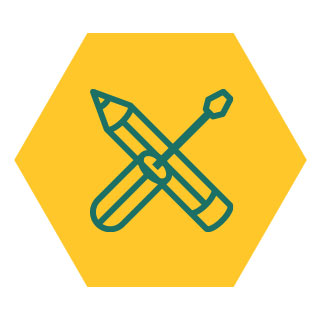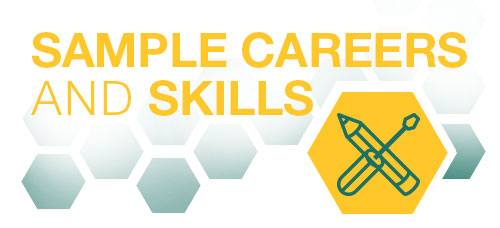What Are My Skills?

Arts students are pollinators of the work world. They have the ability to harvest knowledge, see patterns, synthesize information, and create meaning.

Career Exploration Tip
While completing your Arts degree, take notice of your skills and abilities in the classroom. These are clues about how you like to engage in work tasks. Also, be on the lookout for topics that spark your interests, as these are clues about what you want to learn more about and will help to uncover exciting career paths.
As technology and artificial intelligence continue to transform how we live and work, cognitive, social, and emotional skills are seeing an increased workplace value yet, employers find these skills lacking in entry-level new hires. Interestingly, while employers may find these skills difficult to come by in new hires, they are precisely the skills College of Arts students are developing during their academic careers.
Here are some of the in-demand knowledge, skills, work habits, and character traits commonly associated with an Arts degree:
- Critical thinking, problem-solving, reasoning, analysis, interpretation, synthesizing information
- Research skills and practices, interrogative questioning
- Creativity, artistry, curiosity, imagination, innovation, personal expression
- Perseverance, self-direction, planning, self-discipline, adaptability, initiative
- Oral and written communication, public speaking and presenting, listening
- Leadership, teamwork, collaboration, cooperation, a knack for using virtual workspaces
- Information and communication technology literacy, media and internet literacy, data interpretation and analysis, computer programming
- Civic, ethical, and social-justice literacy
- Economic and financial literacy, entrepreneurialism
- Global awareness, multicultural literacy, humanitarianism
- Scientific literacy and reasoning, the scientific method
- Environmental and conservation literacy, ecosystems understanding
Identifying Your Knowledge, Skills, and Attitudes will help you name your strengths, and what you want to grow and develop during your academic career
Participating in experiential learning can help you learn and grow skills through active engagement of learning something new or building onto existing learning. The How to Gain Experience page will help you learn more about curricular and co-curricular experiential learning opportunities and identify additional skills and competencies you are building in the classroom through knowledge, skills, and attitudes that support your career growth and development.
Knowledge
Includes the ability to make sense of and apply concepts, theories, and practices of business, management, and finance.
Includes the ability to make sense of and apply concepts, theories, and practices from the arts and humanities.
Includes the ability to make sense of and apply concepts, theories, and practices from communication, scientific, mechanical, and design technologies.
Includes the ability to make sense of and apply mathematical concepts, theories, and practices.
Includes the ability to make sense of and apply scientific concepts, theories, and practices from the natural, social, and applied sciences.
Skills
Communication Skills
Includes the ability to exchange information and ideas with other people through speech, active listening, and non-verbal cues.
Includes the ability to find, interpret, evaluate, use, and create images and visual media.
Includes the ability to communicate information and ideas through written or typed text.
Critical and Creative Thinking Skills
Includes the ability to imagine and devise new ways of addressing problems, answering questions, or expressing meaning through the application, synthesis, or repurposing of knowledge.
Includes the ability to identify, analyze, and evaluate situations, ideas, and information.
Includes the ability to integrate and apply relevant information from a variety of sources into new or broader contexts.
Includes the ability to assess, prioritize, and evaluate potential solutions to problems by asking relevant questions, identifying root causes, and gathering facts.
Interpersonal Skills
Includes the ability to identify sources of conflict and take steps to minimize or overcome disharmony.
Includes the ability to direct, guide, and motivate others to accomplish a common goal or purpose.
Includes the ability to communicate, interrelate, and function well in diverse social and cultural settings.
Includes the ability to contribute to the shared purpose of a group, network or partnership through a commitment to sharing power, resources, expertise, and perspectives.
Project Management Skills
Includes the ability to make timely decisions based on a thorough assessment of short- and long-term effects, recognizing political and ethical implications on those affected.
Includes the ability to locate, select, organize, and document information from a variety of sources using appropriate technology and information systems.
Includes the ability to establish tasks and allocate resources to meet objectives, monitor progress, and revise plans to reflect new information.
Includes the ability to manage several tasks at once, being able to set priorities, and allocate time efficiently to meet deadlines.
Attitudes
Includes the ability to show flexibility and openness to changing plans, methods, opinions, or goals in light of new information and changing circumstances. Ability to work both independently and as part of a team.
Includes the ability to ask questions and demonstrate open-mindedness and inquisitiveness.
Includes a willingness to proactively take on responsibilities and challenges.
Includes the ability to sustain interest, effort, and motivation to persevere in accomplishing a task or goal.
Includes the ability to set personal and professional goals, be accountable for actions, consider the needs of others, attend proactively to one’s mental and physical wellbeing, and work safely.
Includes the ability to acknowledge and reflect on personal strengths, areas for development, values, limits, feelings, motivations, and biases.
Sample Careers and Skills

